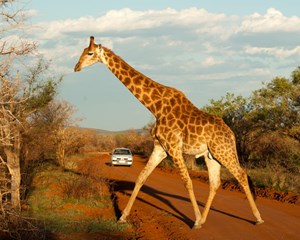"Spending by safari tourists is the single biggest funder of conservation in Africa," says Kenya-based conservationist Max Graham, the founder of Space for Giants, an international charity that protects Africa's elephants and their landscapes. "Because of COVID, that money has disappeared." In the short term that means that veterinary care, endangered-species-rehabilitation programs and community-education efforts have been curtailed.
馬克斯·格雷厄姆是一家保護非洲大象及非洲景觀的國際慈善機構“巨人空間”的創始人,同時也是肯尼亞的自然資源保護主義者,他說:“游獵游客的花費是非洲自然保護基金最主要的收入來源,但是受新冠的影響,這筆收入沒了。”其短期影響就是,獸醫護理、瀕危物種康復計劃以及社區教育努力都將被縮減。
But if tourism numbers don't pick up quickly, the temptation will be to convert some of Africa's 8,400 protected areas into more immediately lucrative enterprises, such as oil extraction, logging or mining. The welfare of some of Africa's most threatened species will be at risk.
假若游客量無法迅速回升,那么將非洲8400個受保護的地區中的一些轉化為可以迅速獲利的公司(比如石油開采、伐木或采礦)將變得極具誘惑,如此一來非洲的一些最受威脅物種的福利將面臨危機。
Nowhere is that more visible than in the small private game reserves that make up the bulk of South Africa's tourism industry, which indirectly employs some 1.5 million people and contributes 7% of the country's GDP.
這一點在小型私人狩獵保護區表現最為明顯,這些保護區是南非旅游業的主要組成部分,間接雇用了150萬人,貢獻了南非7%的GDP。

When De Jager decided to convert his family's dairy farm to a nature reserve 20 years ago, his idea was to reintroduce the rhinos, elephants and lions that once roamed South Africa's Western Cape. He wanted to preserve as well as educate: Fairy Glen has been a regular stop for school groups from the area. But 90% of the paying visitors come from abroad, and they cover 100% of the reserve's running costs, which amount to approximately $30,000 a month, Wilkens says.
20年前,當德雅格決定將自家的奶牛場改造成自然保護區時,他的想法是重新引入曾經在南非的西開普省游蕩的犀牛、大象和獅子。他既想保護森林,又想教育人們:仙女谷是該地區學校團體的固定停留地。威爾肯斯稱,90%的付費游客來自國外,他們承擔了保護區每月約3萬美元的全部的運營成本。
So far, she has been able to stave off her worstcase scenario. Unusually heavy rains mean there has been enough forage to feed the browsing animals. And when a couple of the antelopes died in a bad storm, Wilkens was able to feed the carcasses to the lions. But cutting staff and security patrols has had consequences. On the night of July 27, one of the reserve's rhinos went missing. After a thorough search, she concluded it must have been stolen or poached. The experience has left her shaken: "I can't help but feel like we let our animals down because we couldn't provide the security they needed because of a loss of income."
到目前為止,她已經能夠避免出現最糟糕的情況。意外的暴雨說明他們能夠有足夠的飼料來喂養那些以草為食的動物。在一場風暴中死亡的幾只羚羊的尸體也被用來喂食獅子。不過,裁員和取消安全巡邏帶來了后果。7月27日晚,保護區的一頭犀牛失蹤。經過徹底搜查,她斷定犀牛一定是跑了或者被偷獵了。該事件讓她極為震驚,她說:“我覺得是我們讓動物們失望了,因為沒有了收入,我們無法再為它們提供所需的安全。”
Overall, poaching for animal parts such as rhino, horn, and elephant tusk has declined in African game reserves over the COVID period, as it's harder for criminals to sell the products. But conservation organizations say killing wild and endangered animals for their meat, so-called bushmeat poaching, is on the rise. That spike, says Graham of Space for Giants, is largely due to the collapse of wildlife tourism. When guides, rangers and resort employees no longer have the income to buy food, some will have no choice but to turn to hunting in the areas they once protected. Wilkens, at Fairy Glen, suspects some of her antelope may have ended up as someone's dinner. "It's devastating for us," she says, "but it is also understandable. They have children to feed. If I were in the same position, I most probably would do the same."
總之,由于銷路不好,新冠期間在非洲野生動物保護區偷獵犀牛、角和象牙等動物部位的行為有所減少。但是,保護組織稱將野生和瀕危動物殺死用來自食的現象在增多。來自“巨人空間”的格雷厄姆稱這種激增在很大程度上源于野生動物旅游業的陷落。當導游、護林員和度假村雇員沒有收入購買食物時,別無選擇的他們只能在自己曾經保護的地區進行狩獵。精靈谷的威爾金斯懷疑自家的一些羚羊最后可能成了某人的晚餐。她說:“這對我們來說是毀滅性的打擊,不過我們也能理解,畢竟他們有孩子要養,如果我和他們一樣,我也有可能做出同樣的選擇。”
譯文由可可原創,僅供學習交流使用,未經許可請勿轉載。












